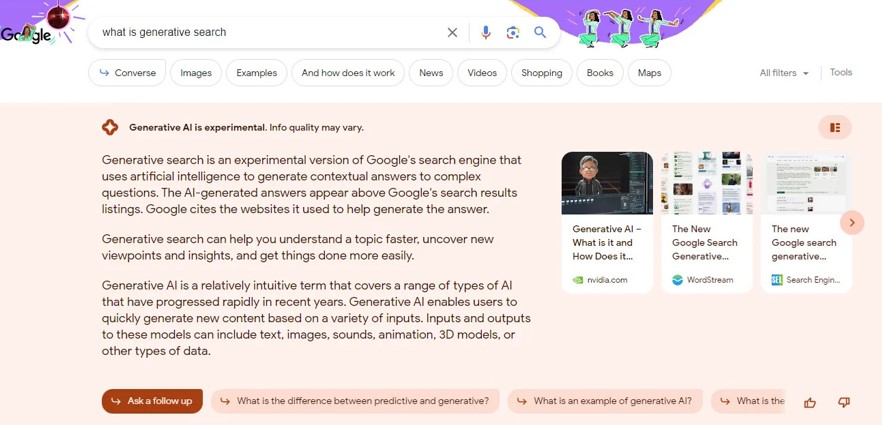How Google’s Generative AI Search will Transform the Blogging Industry Forever

Google’s Search Generative Experience (SGE) has raised concerns among bloggers, who worry about a potential decline in traffic and the threat of being overshadowed. However, a closer examination reveals that the impact of generative AI search on the blogging industry is more nuanced than initially thought.
In this article, we will explore generative AI search, its implications for bloggers, and how bloggers can adapt to thrive in this evolving digital landscape.
Content
Understanding Google’s Search Generative Experience (SGE)
The Google Search Generative Experience (SGE) is an innovative feature that incorporates artificial intelligence (AI)-powered results into Google search engine query responses.
As Alphabet’s flagship product, the Google search engine has continuously evolved to provide users with relevant and accurate responses to their queries. In the past, Google relied on web crawlers to collect and index information from websites, which were then ranked using advanced algorithms to enhance the search experience.
How SGE Works
Instead of solely relying on data indexed through the traditional search approach, SGE leverages a large language model called the Pathways Language Model (PaLM) 2.
Developed through training on vast amounts of data, PaLM 2 is a transformer neural network that empowers AI to generate inferences and suggestions, thus enhancing user search results.
Enhancing the Search Experience
The primary objective of SGE is to enrich search queries by providing additional context and information. By incorporating generative AI, SGE enables users to gain deeper insights, access fresh perspectives, and simplifies the search process.
The integration of generative AI into search has the potential to revolutionize user interactions with search engines.
SGE Search Results
When utilizing SGE, search results are presented in a structured manner. Users are presented with an AI-generated summary area that includes relevant images, followed by links to access more detailed information.
The search results page is completed with sponsored links, organic links, Featured Snippets, and People Also Ask dropdowns.
Watch the video below to understand how SGE will show the result:
The Google Search Generative Experience (SGE) ushers in a new era of search capabilities by integrating AI-powered results into Google’s search engine responses.
By enabling deeper understanding, revealing fresh perspectives, and simplifying the search process, SGE aims to enhance the overall search experience for users. As SGE continues to evolve, digital professionals will need to carefully consider and adapt their SEO, marketing, advertising, and ROI strategies to leverage its potential.
Read: How to Keep Your Google Account Active and Avoid Data Deletion
Why is Google bringing AI in search?
Google incorporates AI into its search engine for various reasons. Here are the key motivations behind Google’s utilization of AI in search:
Sustaining Market Dominance
As a leading search engine, Google is constantly dedicated to enhancing its search capabilities and staying ahead of the competition. With a firm commitment to innovation, Google leverages cutting-edge AI technologies to solidify its position in the market and deliver advanced search functionalities.
In light of Bing, its top competitor, introducing Chat GPT-4 and using the full potential of AI in its search engine, Google recognizes the urgency to maintain its competitive edge. To accomplish this, Google is determined to bring the best of AI into its search engine experience.
This is the same reason why Meta introduced Threads App. It’s almost same as twitter and does the same thing.
Real-Time Information
With the ever-increasing demand for up-to-date information, Google recognizes the importance of delivering real-time search results.
By harnessing AI, Google can swiftly provide users with the latest and most relevant information, catering to their need for instant access.
Enhancing User Experience
Google places a strong emphasis on improving the user experience through AI-powered search. By utilizing generative AI search technologies, Google can generate accurate and comprehensive answers directly on the search results page.
This eliminates the need for users to navigate through multiple links, resulting in a more efficient and satisfying search experience.
More Personalized Search Results
AI-driven search empowers Google to provide personalized search results tailored to individual users’ preferences and browsing history. By analyzing user behavior patterns, AI algorithms offer more relevant recommendations, enhancing the overall search experience by delivering search results that align with users’ unique needs.
What Skills AI Can’t Replace Now or In the Foreseeable Future
Limitations of Generative AI
It is essential to acknowledge the limitations of generative AI in comparison to content created by human writers. Generative AI struggles to replicate the depth, subjective analysis, and emotional understanding that bloggers bring to their writing.
Bloggers possess a unique skill set that allows them to excel in addressing complex and nuanced topics, leveraging their expertise and personal experiences. Their ability to provide insightful perspectives adds a level of depth and authenticity that generative AI cannot match.
While Google’s generative search experience leverages AI, it relies heavily on current data and information from real human sources. This highlights the indispensable role of humans in ensuring that the search results are accurate, reliable, and up-to-date.
Despite advancements in AI technology, the contextual understanding, creativity, and empathetic touch brought by human writers remain irreplaceable. Moreover, it is worth noting that Google recognizes the importance of promoting authentic information.
There may be instances where Google restricts AI-generated results to ensure that users are served with the most credible and trustworthy information available.
In summary, while generative AI offers remarkable capabilities, it falls short when compared to the expertise, personal insights, and emotional nuances that human bloggers bring to their craft. The collaboration between AI and human writers is crucial to ensure a comprehensive and reliable information ecosystem for users.
Challenges Faced by Bloggers
Bloggers are concerned about the potential impact of generative AI search on their website traffic and revenue.
If AI-generated answers are readily available on the search results page, users may be less likely to click on blog posts, especially for simpler queries. This poses a challenge for bloggers who rely on monetized traffic.
Opportunities for Bloggers
Despite the challenges posed by generative AI search, bloggers can adapt and thrive by embracing the following strategies:
Focus on Quality and Uniqueness
Bloggers should prioritize providing high-quality content that offers unique insights, analysis, and perspectives. By setting themselves apart from AI-generated results, bloggers can attract audiences seeking in-depth and personalized information.
Utilize Long-Tail Keywords
Using specific phrases or questions as long-tail keywords helps bloggers capture niche audiences and improve search engine rankings. By addressing detailed subtopics related to their main topic, bloggers can optimize their content for long-tail keyword searches and increase visibility.
Incorporate Visual Elements
By including images, infographics, and videos in their blogs, bloggers can enhance user engagement and differentiate themselves from text-based AI-generated results. Visual content adds value and provides a more immersive experience for readers.
Build Connections and Community
Engaging with readers through comments, social media, and email newsletters fosters a sense of community around a blog. By building strong relationships and offering personalized interactions, bloggers can create loyalty and retain a dedicated audience.
Diversify Monetization Strategies
Relying solely on traffic for monetization may become less sustainable in light of generative AI search. Bloggers should explore alternative revenue streams such as sponsored content, affiliate marketing, online courses, digital products, or membership programs to mitigate potential fluctuations in traffic.
Establish Expertise and Authority
Bloggers have the advantage of being subject matter experts in their respective niches. By consistently delivering valuable and authoritative content, bloggers can position themselves as trusted sources of information. This builds credibility and attracts an audience seeking reliable insights beyond what AI-generated responses can provide.
Adapt to Evolving Search Algorithms
To stay visible in search results, bloggers must keep up with the latest trends and SEO practices. Being aware of changes in search algorithms allows bloggers to optimize their content and maintain visibility.
Embracing Change and Evolution
The blogging industry has always adapted to changes in search algorithms and technology. While generative AI search presents challenges, it also pushes bloggers to enhance the quality, uniqueness, and depth of their content.
By embracing these changes, bloggers can elevate their craft, establish their expertise, and maintain relevance in the evolving digital landscape.
Who Should Be Concerned?
The integration of artificial intelligence (AI) into Google Search has brought about a significant transformation in the way we access information online.
While there are numerous benefits to AI-powered search engines, certain groups or industries should be mindful of the potential implications. Let’s delve into who should be concerned about AI in Google Search.
Bloggers Specializing in Niche Topics
Bloggers who focus on specific niche topics may face challenges due to the integration of AI in Google Search. If these bloggers have experienced a significant decrease in traffic over the past few months, it could be attributed to users shifting towards alternative AI tools such as ChatGPT and Bard instead of relying solely on traditional Google Search.
Generative AI platforms provide users with interactive and personalized content, which can be more engaging. If this trend continues, bloggers specializing in niche topics may face further impact as generative AI results become more prominent in Google Search.
To remain competitive, bloggers need to explore new ways of incorporating AI tools into their content creation strategies to enhance user experience and engagement.
Freelance Writers
Freelance writers, especially those who create content for bloggers and earn based on the number of articles produced, may have valid concerns regarding AI-generated content. The advancements in natural language processing and machine learning have empowered AI to assist blog owners in writing content more efficiently and effectively.
AI algorithms can improve grammar, style, and clarity, potentially reducing the demand for human writers in the future. While AI-generated content cannot match the creativity and unique perspectives of human writers, it presents a challenge to freelance writers who rely solely on their writing skills for income.
Content Aggregators
Content aggregators, websites that collect and present information from various sources, may also have concerns regarding the rise of AI in Google Search. With AI-powered search engines providing direct and accurate answers to user queries, the need for users to visit external websites decreases.
This shift could potentially impact the traffic and revenue generation of content aggregators, as users may find all the relevant information they need directly on the search engine results page (SERP).
Content aggregators will need to adapt their strategies by providing unique value-added content or exploring partnerships with AI platforms to maintain their relevance and attract users.
SEO Professionals
Search Engine Optimization (SEO) professionals play a vital role in helping websites rank higher on search engine result pages through traditional SEO practices. However, the introduction of AI in Google Search has revolutionized the SEO landscape.
AI algorithms now prioritize content quality, relevance, and user experience, rendering some traditional SEO techniques less effective. As AI continues to evolve, the demand for SEO professionals who solely rely on outdated SEO practices may decrease.
SEO experts need to adapt and expand their skill set to include AI-driven optimization strategies to stay competitive in an ever-evolving search ecosystem.
Traditional Advertising Agencies
AI in Google Search has the potential to disrupt traditional advertising agencies. As AI algorithms gain a deeper understanding of user intent and behavior, search engine advertising becomes more targeted and effective.
This may lead businesses to rely more on automated AI-driven advertising solutions instead of traditional ad agencies. Advertisers will need to embrace AI technologies and develop expertise in AI-driven advertising platforms to stay competitive in the evolving digital advertising landscape.
Frequently Asked Questions (FAQs)
Will generative AI replace human-generated content in search results?
No, generative AI has its limitations when it comes to replicating the depth, analysis, and emotional understanding that human bloggers bring to their writing. Bloggers excel in dealing with complex and nuanced topics that require expertise and personal experiences.
How can bloggers stand out from generative AI-generated search results?
Bloggers can differentiate themselves by focusing on providing high-quality, unique content that offers insights, analysis, and perspectives beyond what AI can provide. By delivering valuable and personalized information, bloggers can attract audiences seeking in-depth knowledge and a human touch.
Can bloggers still monetize their blogs effectively with the rise of generative AI?
Yes, bloggers can diversify their revenue streams by exploring sponsored content, affiliate marketing, online courses, digital products, or membership programs. While relying solely on traffic may become less sustainable, alternative monetization strategies can help mitigate potential fluctuations.
How can bloggers optimize their content for generative AI search?
Bloggers can optimize their content by focusing on comprehensive information, using structured data markup to provide context to search engines, and ensuring their websites are mobile-friendly and optimized for fast loading speeds. Additionally, incorporating long-tail keywords relevant to their niche can improve visibility.
Are there specific strategies for bloggers to adapt to generative AI search?
Yes, bloggers can adapt by embracing a multi-channel approach. They can leverage social media platforms, guest blogging opportunities, collaborations, and explore podcasting or video content creation. By diversifying their reach and engaging with different audience segments, bloggers can thrive alongside generative AI search.
What role does user experience play in competing with generative AI search?
User experience is crucial for bloggers to retain and attract audiences. By delivering a seamless and engaging experience through intuitive navigation, mobile responsiveness, and interactive elements, bloggers can create a unique value proposition that sets them apart from AI-generated results.
Is it still worth investing time and effort in blogging with the rise of generative AI search?
Absolutely. Blogging continues to be a valuable platform for creativity, expertise, and audience engagement. While generative AI search presents challenges, bloggers can adapt and thrive by providing unique perspectives, establishing credibility, and connecting with their audience on a deeper level.
How can bloggers stay informed about changes in search algorithms and technology?
Bloggers should actively follow industry publications, attend conferences or webinars, engage in relevant online communities, and subscribe to newsletters or blogs specializing in SEO and digital marketing. Staying updated on industry trends helps bloggers adjust their strategies accordingly.










